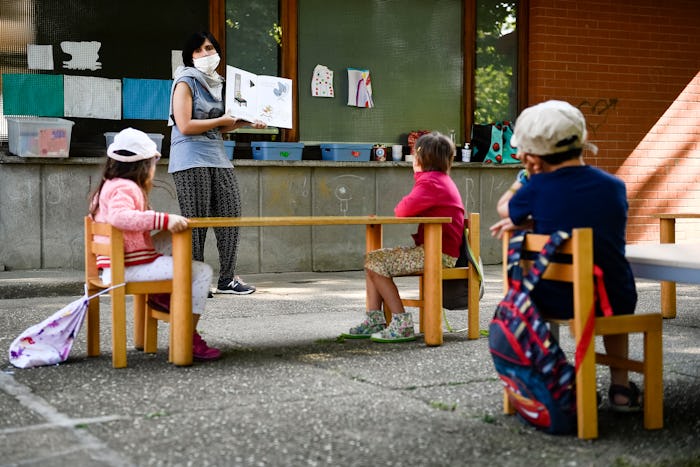News

Moving School Outside Is One Way To Reduce Coronavirus Risks, Experts Say
As some schools across the country begin to formulate plans for a return to in-person learning next fall, certain experts have suggested taking the classroom outside. Citing health officials' belief that the risk of contracting the novel coronavirus while outdoors is considerably lower than the risk of indoor exposure, many are wondering if outdoor classrooms could reduce the risk of coronavirus and potentially serve as a safer option for schools that have the space.
After rolling out phased reopening plans and beginning to lift restrictions, many states have quickly seen a rise in coronavirus cases. Data from John Hopkins University (and presented by CNN) has shown that 36 states are currently seeing an uptick in infection numbers. As a result, at least 16 states have opted to roll back or pause their reopening plans, CNN reported. The spike in infections has also forced schools and education officials to re-think their return to traditional in-classroom learning.
As part of Connecticut's plans for returning students to school in the fall, the state's education commissioner told The Hartford Courant some high schools might hold classes outside if weather permitted. In Indiana, Central Noble Primary is considering expanding their outdoor school program to include both kindergartners and first graders come fall, according to the Albion New Era. EmpoweredEd DC, an organization made up of teacher leaders in Washington, D.C., has petitioned school officials in the federal district to at least consider plans for outdoor classrooms when learning resumes in the fall.
The idea to move the classroom outside reportedly comes from Denmark, where some schools created temporary classrooms in parks and playgrounds or emphasized outdoor learning activities when the country reopened primary schools in April. "The morning is spent doing maths or science, where we include children who are still at home, via Zoom," Claire Astley, a teacher in Vester Skernige, on Fyn told The Local. "Then we'll go outside and do activities like digging in the school garden, getting tadpoles from the lake, or going on bike tours to the forest or beach."
Italy's education minister has also announced plans to incorporate outdoor lessons in the country's plan to return children to in-person learning in the fall, The Local reported. And in Scotland, Edinburgh's City Council has offered to allow schools to use the city's parks, woodlands, and natural heritage as outdoor classrooms come August, Edinburgh Live reported.
Most recently, The American Academy of Pediatrics (AAP) released guidance strongly advocating for all U.S. policy considerations pertaining to the coming school year begin with a goal of returning students to in-person learning. Along with urging hand-washing, physical distancing, face masks, cohort classes, and increased cleaning and disinfection, the AAP also urged schools to utilize outdoor spaces when possible.
The Centers for Disease Control and Prevention (CDC) has said the risk of getting coronavirus remains lower when outdoors as opposed to indoors. "Activities are safer if you can maintain at least 6 feet of space between you and others, because COVID-19 spreads easier between people who are within 6 feet of each other," the CDC has stated. "Indoor spaces with less ventilation where it might be harder to keep people apart are more risky than outdoor spaces." Additionally, a study from researchers in China found that out of 7,324 coronavirus cases, just one stemmed from transmission that happened outdoors.
Still, it remains unclear how many school districts in the United States might consider the use of outdoor classrooms when planning for students' fall return.
If you think you’re showing symptoms of coronavirus, which include fever, shortness of breath, and cough, call your doctor before going to get tested. If you’re anxious about the virus’s spread in your community, visit the CDC for up-to-date information and resources, or seek out mental health support. You can find all of Romper’s parents + coronavirus coverage here.